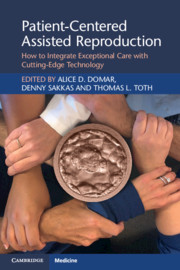 Patient-Centered Assisted Reproduction
Patient-Centered Assisted Reproduction Book contents
- Patient-Centered Assisted Reproduction
- Patient-Centered Assisted Reproduction
- Copyright page
- Contents
- Contributors
- Introduction
- Chapter 1 Access to Infertility Care
- Chapter 2 The Patient Evaluation of the Future: Genetics, New Diagnostics, and Prediction Modeling
- Chapter 3 Advances in ART Pharmacology: Drug Delivery Systems and the Pipeline
- Chapter 4 ART Monitoring: An End to Frequent Clinic Visits and Needle Sticks?
- Chapter 5 The IVF Cycle to Come: Laboratory Innovations
- Chapter 6 Integrative Care
- Chapter 7 Psychological Counseling: Ethical Challenges of the Future
- Chapter 8 Using Technology to Enhance Communication in Medically Assisted Reproductive Care
- Chapter 9 The Economics of IVF: Evaluating the Necessity and Value of Public Funding
- Chapter 10 Medical and Elective Fertility Preservation: Options and Suggestions for a Patient-Centered Approach
- Chapter 11 Patient Retention, Nursing Retention: The Importance of Empathic Communication and Nursing Support
- Chapter 12 Patient-Centered IVF Care
- Chapter 13 The IVF Patient Journey of the Future
- Index
- References
Chapter 6 - Integrative Care
Published online by Cambridge University Press: 02 March 2020
- Patient-Centered Assisted Reproduction
- Patient-Centered Assisted Reproduction
- Copyright page
- Contents
- Contributors
- Introduction
- Chapter 1 Access to Infertility Care
- Chapter 2 The Patient Evaluation of the Future: Genetics, New Diagnostics, and Prediction Modeling
- Chapter 3 Advances in ART Pharmacology: Drug Delivery Systems and the Pipeline
- Chapter 4 ART Monitoring: An End to Frequent Clinic Visits and Needle Sticks?
- Chapter 5 The IVF Cycle to Come: Laboratory Innovations
- Chapter 6 Integrative Care
- Chapter 7 Psychological Counseling: Ethical Challenges of the Future
- Chapter 8 Using Technology to Enhance Communication in Medically Assisted Reproductive Care
- Chapter 9 The Economics of IVF: Evaluating the Necessity and Value of Public Funding
- Chapter 10 Medical and Elective Fertility Preservation: Options and Suggestions for a Patient-Centered Approach
- Chapter 11 Patient Retention, Nursing Retention: The Importance of Empathic Communication and Nursing Support
- Chapter 12 Patient-Centered IVF Care
- Chapter 13 The IVF Patient Journey of the Future
- Index
- References
Summary
Couples (or individuals) present for fertility treatment because they are unable to conceive a viable pregnancy on their own. From a purely medical model perspective, the goal is fairly straightforward: to achieve a pregnancy in patients who would otherwise not have been able to do so, using a menu of reproductive technology options. This medical model approach may not be the best way to comprehensively care for patients, however. The approach tends to ignore social and behavioral factors that may impact outcomes, assumes that patients will remain in care until the anticipated pregnancy is achieved (or is determined to be no longer possible by the physician), and places relatively greater emphasis on achievement of pregnancy than on healthy outcomes for mother and child.
- Type
- Chapter
- Information
- Patient-Centered Assisted ReproductionHow to Integrate Exceptional Care with Cutting-Edge Technology, pp. 67 - 80Publisher: Cambridge University PressPrint publication year: 2020
References
Recommended Reading
References
- 1
- Cited by
